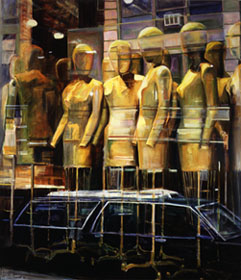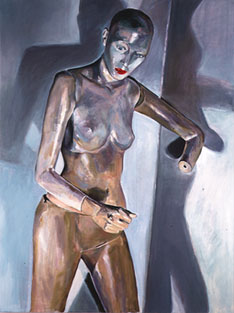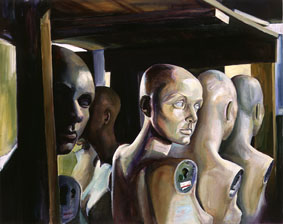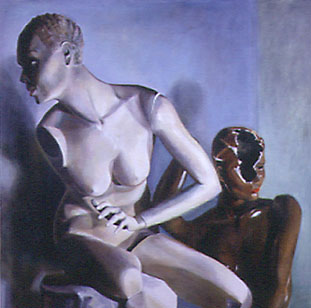
© Joan Semmel
Soho Display, 1996
Oil on Canvas
72" X 62"
| The canvas space is filled with bodies, and fragments of bodies. Bodies are the surface of the painting, though they push into space, foreshortened or twisted in some kind of contrapposto. That has always been the case in Joan Semmel's work. The space and the surface are the body, or bodies, which are totally engaged in their existence, their sexual and physical being. They form a psychological site. If Abstract Expressionist paintings are landscapes of the mind or psyche, Semmel's paintings incorporate abstraction. In her coupled females and males of the 1970s, one sees as far as the feet; flesh encompasses the world, and consciousness. In the locker-room paintings of the 1980s, women's bodies move in a way that defines and is defined by the environment. The symbiosis, in other words, is definitive and completely contained in moments of the artist's awareness. In a painting of Semmel's young son in the bath, shown in a 1999 exhibition at the Matthew Marks Gallery, the intimacy of body and place is extraordinary, erasing the distance that people seem to require. Nakedness is a given in all of these. |
 © Joan Semmel Soho Display, 1996 Oil on Canvas 72" X 62" |
| The paintings in this show are of mannequins, which represent a kind of terminal nakedness and awakening consciousness--new-bornness in long experience. At first, that is in the earliest of these paintings, SoHo Display of 1996, the figures are simply dressmaker's dummies, without hands, legs, or facial features, lined up in a storefront window, which reflects the life of the street--a car with someone in it, the buildings across the street. The dummies, all of them seemingly female, are woven into the fabric of the city, and yet already they occupy some other realm, not exactly Olympian, but above, looking down. They have some kind of power within the abstract grid structure that also traps them. |
 © Joan Semmel Hot Lips, 1997 Oil on Canvas 60" X 60" |
And the power only increases, as Semmel focuses on mannequins with legs, hands, and facial features, nearly fully formed human figures. As they become more powerful they become more vulnerable, more human. In Hot Lips, 1997, the mannequin seems to move and her lips are painted red. Every surface of her head and body is highlighted and modeled in gray, white, blue, and ochre, and that makes her live as much as her movement and gaze. She and her environment are occluded, like a sky in rapidly changing weather. She is intertwined now not with building facades and windows but with her own shadows and an abstracted space that seems to divide her existence. In a sense idealized, like a Greek mythological figure (or the modern fashion model she simulates), she is also damaged, diseased, perhaps near death, even as she is being born. |
 © Joan Semmel Stacked, 1998 Oil on Canvas 40" X 50" |
There is no need to think of these things as
anything more than for their use. They are symbols of all objectification, malignant
or otherwise, what anyone sees (especially what an artist sees). As statues,
works of art, they are already once removed. And yet they persist. It is possible
to erase their eyes and red lips, to take their arms off and put them in a crate
for shipping as Semmel does in Stacked, 1998, and still their heads turn,
openly and in shadow, probably accusingly. The modeling of their bodies is as
intense now as the hard structure of the crate into which they are crowded. A
bus or train going somewhere useless, a ride over the Styx, perhaps? The implications
are impossible to avoid.
|
| The latest of the 20 paintings in
the exhibition, Sisters of 2000, is also the starkest and most powerful.
The close background is pale blue and green like some idyllic setting. One dark
brown mannequin with red lips sits with her head bashed in on the right. The
other more vigorous figure, with African-American features and hair and white
skin, turns sharply away to her right and stares dramatically into the shallow
lateral space. This is the plane of action where everything takes place. For
the artist there is no other place. She is forced to be there; we are forced
to be there, to act and be acted upon.
Donald Goddard © 2000 |
 © Joan Semmel Sisters, 1998 Oil on Canvas 60" X 60" |
|
A painting is a contemplative object that stands still and holds your attention for a period of time, not a moving object that is gone in a moment. Yet it reveals the process of its making and all the layers of time that it takes to do it. Through the process of painting, through shifts in emphasis and intentional refinements, the meanings and implications of the images become more intense. --Joan Semmel |
Art Reviews Listings - Previous Review - Next Review
Art Review - NYArtWorld.com - NYAW.com. All artwork is copyright of the respective owner or artist. All other material © Copyright 2015 New York Art World ®. All Rights Reserved.
New York Art World ® - Back to Top